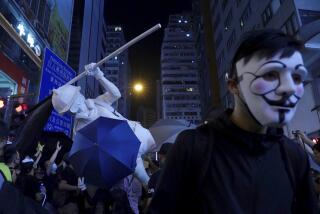John Stewart Service; Diplomat Predicted China Civil War, Fell Prey to McCarthy
John Stewart Service, one of the most celebrated of the “old China hands” in the U.S. Foreign Service whose careers were derailed or destroyed during the McCarthy era, died at an Oakland retirement home Wednesday. He was 89 and died of heart disease.
Service had been a diplomat in China for 12 years when he predicted that a civil war would erupt and that Mao Tse-tung’s Communist army would trounce the Nationalists led by Chiang Kai-shek.
But instead of being rewarded for his prescience, Service was scorned, accused of disloyalty and ousted from the State Department. Although cleared six times of the charges and restored to the Foreign Service after the U.S. Supreme Court overturned his firing in 1951, Service was never able to resume his diplomatic career on the same high level. His name was repeatedly invoked in the ensuing debate in America, led by then-Sen. Joseph McCarthy, Richard Nixon and others, over “who lost China?”
The son of American missionaries, Service was born Aug. 3, 1909, in Chengdu, China. His father, Robert Roy Service, established the first YMCA in Chengdu.
Service graduated from high school at 15 and apprenticed himself to a Shanghai architectural firm that designed buildings for the YMCA. When he was ready for college two years later, he traveled to the United States by himself, eventually enrolling at Oberlin College, where he studied art history and met his future wife, Caroline Schulz, the daughter of an army officer.
Known as Jack to his friends, Service entered the Foreign Service in 1933. One of his chief responsibilities became keeping in touch with the Communists. While in Yenan, he saw Mao and Chou En-lai at Saturday night parties in a pear orchard. He became one of the few American diplomats whom Mao and Chou knew well.
In 1944, he reported to the State Department an extraordinary eight-hour conversation with Mao in which Mao begged for American help in the coming power struggle in China. Mao told Service that he did not expect Soviet aid and argued that China and the United States had common economic and political interests at stake.
Service described the Nationalist government as corrupt and ineffective and he and other China analysts recommended some cooperation with the Communists.
The U.S. government, however, decided to continue to support Chiang’s Nationalist forces.
In an oral history published in the 1995 book, “Red Scare, Memories of the American Inquisition,” Service acknowledged that he might have been guilty of brashness at worst.
“I felt that our policy of backing the Chinese Nationalists was a hell of a mistake. I was talking fairly freely about the need for an evenhanded policy in a rather hotheaded, youthful way--I was what, 35, 36? I thought what was going to happen in China was a disaster. Well, it was a disaster. Civil war was starting and we knew a civil war would end in Communist victory. . . .”
Chiang sympathizers in the United States, however, came to regard Service’s prediction as a preference. Service became a prime target of McCarthy, who denounced him as a “known associate and collaborator” of Communists and accused him and other China hands of “selling China out.”
Service was recalled from China and accused of treason for allegedly sharing top secret documents with a left-wing journal, Amerasia. In March 1950 McCarthy put Service on his list of “bad security risks” in the State Department, despite protests from Deputy Undersecretary John E. Peurifoy that the senator was reviving “dead, discredited, disproved charges” against him.
Service was subjected to loyalty investigations for six years and was cleared each time. But the State Department fired him in December 1951 after the Loyalty Review Board found “reasonable doubt” of his allegiance.
He was a marked man. He could not rent an apartment in New York--”The only question they asked,” he later recalled, “was, ‘Is this the same man who was fired by the State Department? Sorry.’ ” Service was even turned down for life insurance. Nor were employers banging on his door, although he eventually was offered a job in a company that made steam traps, a device he knew nothing about. (He later became an expert, devising and patenting a new kind of valve to control the release of steam.)
The Supreme Court overturned Service’s dismissal in 1957 and Service returned to the Foreign Service. But he was assigned, in his own words, to “Siberian backwaters.” His last posting was to Liverpool, England, where his job was little more than issuing visas. He did not stay long.
After three years, Service told historian Griffin Fariello several years ago, “I realized there wasn’t a prayer for a worthwhile assignment or promotion. So what the hell, why stay around? I’d made my point.” In 1962, at age 52, he retired.
In his later years he was an Asian scholar and editor at the UC Berkeley Center for Chinese Studies and visited China several times after his retirement from academia in 1973. He seemed to harbor no regrets about his ordeal.
“If I had to do it over again,” he said in 1971 of his China career, “I’d probably do just about the same things.”
He is survived by three children, Virginia McCormick of Chevy Chase, Md., Robert Service of Washington, who is a member of the Foreign Service and Philip Service of Flagstaff, Ariz.; seven grandchildren and two great-grandchildren.
More to Read
Sign up for Essential California
The most important California stories and recommendations in your inbox every morning.
You may occasionally receive promotional content from the Los Angeles Times.











